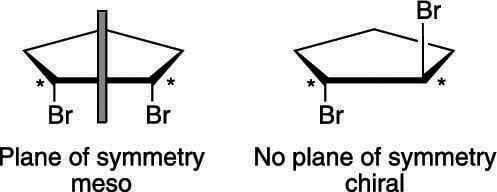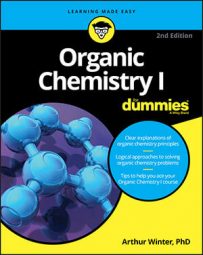Any molecule that contains a chiral center will be chiral, with one exception: a meso compound. A meso compound contains a plane of symmetry and so is achiral, regardless of whether the molecule has a chiral center. A plane of symmetry is a plane that cuts a molecule in half, yielding two halves that are mirror reflections of each other.
By definition, a molecule that's not superimposable on its mirror image is a chiral molecule. Compounds that contain chiral centers are generally chiral, whereas molecules that have planes of symmetry are achiral and have structures that are identical to their mirror images.

For example, cis-1,2-dibromocyclopentane (shown in the first figure) is meso because a plane cuts the molecule into two halves that are reflections of each other. Trans-1,2-dibromocyclopentane, however, is chiral because no plane splits the molecule into two mirror-image halves.
Now look at the mirror images of these two molecules in the second figure to prove this generality to yourself.

Even though the cis compound has two chiral centers (indicated with asterisks), the molecule is achiral because the mirror image is identical to the original molecule (and is, therefore, superimposable on the original molecule). Molecules with planes of symmetry will always have superimposable mirror images and will be achiral. On the other hand, the trans stereoisomer has no plane of symmetry and is chiral.
Meso compounds are achiral.
In organic chemistry, you need to be able to spot planes of symmetry in molecules so you can determine whether a molecule with chiral centers will be chiral or meso. For example, can you spot the planes of symmetry in each of the meso compounds shown in the last figure?


